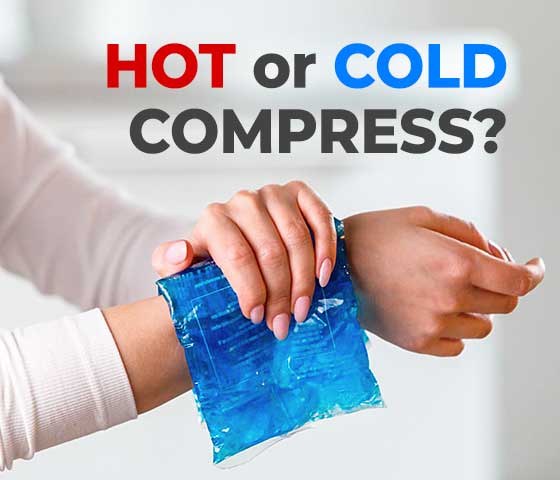Hello, is nice to have you here! When feeling some discomfort or muscle pain, swelling or injury, you’ve probably asked yourself: should I use a hot or cold compress? This doubt is very common, so we bring some tips to clarify.
Anyway, compresses, both hot or cold, can help to relieve the pain, but they can also camouflage a more serious problem. If the pain and discomfort persist, don’t hesitate to contact us at Revolve Physiotherapy, in Milton, Ontario. You can talk to one of our professionals and clarify doubts in this regard. We offer several treatment and therapies options that can solve the problem and put an end to this pain.
Hot and cold compresses are commonly used for different purposes based on the type of injury or condition.
Here are guidelines for when to use each:
Hot Compress: increases blood flow and relaxes
- Muscle pain and stiffness: Apply a hot compress to sore muscles or areas experiencing stiffness. The heat helps relax the muscles, improve blood flow, and reduce discomfort. Hot compresses are particularly useful for muscle strains, sprains, or tension.
- Joint pain and arthritis: Warmth can alleviate joint pain and stiffness associated with conditions like arthritis. Applying a hot compress to affected joints can help reduce inflammation and increase flexibility. However, it’s essential to consult a healthcare professional for proper management of chronic conditions.
- Sinus congestion: For sinusitis or nasal congestion, a warm compress on the face or sinus areas can help relieve pressure, open up nasal passages, and promote drainage.
- Stress relief: Hot compresses can also be used as a relaxation technique. Applying warmth to areas like the neck, shoulders, or back can help relieve tension, reduce stress, and induce a sense of calmness.
Cold Compress: decreases blood flow and swelling
- Acute injuries: Cold compresses are most commonly used for acute injuries like sprains, strains, bruises, or fractures. Applying a cold compress helps reduce inflammation, swelling, and pain by constricting blood vessels in the affected area.
- Headaches or migraines: Cold compresses can provide relief for headaches or migraines. Applying a cold pack or ice wrapped in a cloth to the forehead or the back of the neck can help numb the area, reduce blood flow, and alleviate pain.
- Bruises, inflammations or fractures: Applying a cold compress helps reduce inflammation, swelling, and pain by constricting blood vessels in the affected area.
It’s important to note that these guidelines are general, and individual preferences or specific medical conditions may require variations. If you have any specific concerns or are uncertain about the appropriate treatment, it’s best to consult with a healthcare professional for personalized advice.
At Revolve Physiotherapy, our team of professionals will evaluate a suitable treatment option for your specific needs. Call us now at (905) 864.8181 and talk to one of ours specialist.
Say goodbye to your pain!
Request an appointment today!
